http://www.haaretz.com/hasen/spages/1010459.html
"Putin, an opponent of the U.S.-led war in Iraq, repeated complaints from Moscow about what it says are double standards in the West over the conflict with Georgia, which wants to become a member of NATO.
He mocked the support given by the West to Saakashvili, comparing the Georgian leader to former Iraqi leader Saddam Hussein, who was hanged in 2006 for war crimes.
"They of course had to hang Saddam Hussein for destroying several Shiite villages," Putin said.
"But the current Georgian rulers who in one hour simply wiped 10 Ossetian villages from the face of the earth, the Georgian rulers which used tanks to run over children and the elderly, which threw civilians into cellars and burnt them - they (Georgian leaders) are players that have to be protected."
Pour Washington, il y a donc les "bonnes victimes", celles qui tombent sous les coups de ceux que les chefs occultes des USA ont désignés comme "mauvais", et il y a les "mauvaises victimes", celles qui n'ont pas l'approbation américaine...
Et on le voit bien car la plupart de nos médias persistent à présenter la contre-attaque des Russes comme étant l'invasion et pas la riposte à une crapuleuse agression des Géorgiens contre des populations civiles. France24 a heureusement filmé la capitale d'Ossétie du Sud après le passage des troupes du criminel de guerre Saakashvili (fantoche installé par les Américains comme président de Géorgie). On peut difficilement continuer à nier les faits.
articles & vidéos (c) France24
South Ossetian refugees return to battered Tskhinvali
http://www.france24.com/en/20080818-georgia-south-ossetia-russia-refugees-tskhinvali&navi=EUROPE
Monday 18 August 2008
Days after a shaky ceasefire between Russia and Georgia, South Ossetians progressively are making their way back to their capital Tskhinvali, to discover a town scarred by battle.
By FRANCE 24 (text) / R. Goguelin, A. Pokrovsky (video)
In spite of a ceasefire signed on August 16, Russian troops are still present in Georgia's breakaway province of South Ossetia.
Ossetian refugees, who had fled the violence and the bombings in the area, progressively are making their way back to the capital, Tskhinvali.
The city, however, is not the same. Georgian bombings and street combat have left their mark on the capital. Houses have disappeared, and certain neighbourhoods have been completely wiped out.
FRANCE 24's special correspondent Romain Goguelin met some returning South Ossetian refugees, as well as some residents who stayed on in their city despite the violence.
--------------
Et malgré ça, les Américains veulent continuer à utiliser l'OTAN comme arme contre la Russie. On est loin, très très loin de l'alliance défensive de l'époque de la "guerre froide" et c'est clairement devenu un paravent camouflant les projets hégémoniques US contre tout ce qui s'oppose à eux. A commencer, et on l'oublie de trop, par l'indépendance de l'Europe. On est sidéré de voir les prétendus héritiers du général De Gaule se tenir aux côtés de l'OTAN pour menacer la Russie, le ministre français des affaires étrangères évoquant déjà un ultimatum..
L'Otan se réunit en urgence pour soutenir la Géorgie
http://www.france24.com/fr/20080819-reunion-otan-relations-russie-georgie-condoleezza-rice&navi=MONDE
Mardi 19 août 2008
Convoquée à la demande de Washington, une réunion des ministres des Affaires étrangères des 26 pays de l'Otan se tient ce mardi à Bruxelles, alors que les troupes russes tardent toujours à se retirer de Géorgie.
La Russie ne semble pas décidée à retirer ses troupes de la république indépendantiste d’Ossétie du sud et les Etats-Unis s’impatientent. A leur demande, les 26 ministres des Affaires étrangères de l’OTAN se réunissent, ce mardi, à Bruxelles.
"Un message très clair de solidarité à la Géorgie" sera envoyé a l’issue de la réunion d’urgence, a déclaré Carmen Romero, porte-parole de l’Otan.
Le représentant russe à l’Otan a affirmé que les troupes russes entamaient leur retrait. Mais selon notre envoyé spécial à Tbilissi, Robert Parsons, "aucun mouvement de troupe n’est visible". Il ajoute : "Il n’y a absolument aucune preuve" du départ des soldats russes des provinces séparatistes d’Ossétie du sud, d’Abkhazie ou du cœur du territoire géorgien.
Washington compte demander à ses alliés de réduire les liens de l’organisation avec la Russie. Pour un spécialiste des relations internationales, cette exigence marque une rupture dans les relations Russie-Etats-Unis. "Ce serait aller à contre-courant de tout le travail qui a été fait depuis 20 ans, depuis la fin de la Guerre froide", analyse Jolyon Howorth, professeur de sciences politiques à l’Université américaine de Yale, sur le plateau FRANCE 24.
Une décision forte et commune des 26 membres s’annonce difficile tant la situation est délicate. D’autant plus que l’unité est loin de régner dans les rangs de l’organisation, la "vieille Europe" ne désirant pas créer de "front antirusse".
L’adhésion de la Géorgie à l’OTAN au cœur des discussions
L’élargissement de l’Otan à la Géorgie, cause des tensions avec la Russie, devrait être abordé au cours des discussions. En avril, les pays de l’Organisation atlantique avaient affirmé leur volonté d’intégrer l’ancienne république soviétique. Cette déclaration avait provoqué la colère de la Russie, qui voit d’un très mauvais œil l’intrusion de l’Otan dans ce qu’elle considère comme sa sphère d’influence.
De l’autre coté, la Géorgie attend, à l’issue de cette réunion, une réponse ferme concernant son adhésion à l’Alliance atlantique. "Pour la Géorgie, le seul moyen de protéger le pays, c’est qu’il soit sous le parapluie sécuritaire de l’Otan", affirme Régis Genté, correspondant RFI pour FRANCE 24 à Tbilissi.
De nombreux spécialistes considèrent que la volonté d’élargissement de l’Otan à la Géorgie est la véritable cause du déploiement de troupes russes en Géorgie.
La Russie a assuré suivre de très près la réunion de mardi. "Si des décisions sont prises de facto pour le compte de l’agresseur géorgien, nous ne seront pas en mesure de maintenir la qualité et le calendrier de notre relation avec l’Otan", a déclaré Dmitri Rogozine, représentant de la Russie.
-----------
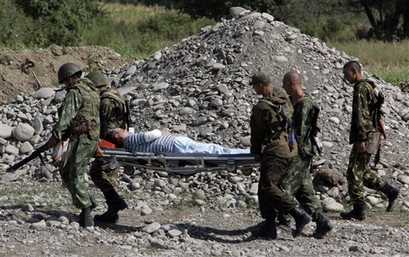 A wounded Russian pilot is carried to a helicopter following prisoners swap in Igoeti, Georgia, northwest of the capital Tbilisi, Tuesday, Aug. 19, 2008. Russia and Georgia exchanged prisoners captured during their brief war, a move that may reduce tensions and, Georgia hopes, hasten the promised withdrawal of Russian troops.
A wounded Russian pilot is carried to a helicopter following prisoners swap in Igoeti, Georgia, northwest of the capital Tbilisi, Tuesday, Aug. 19, 2008. Russia and Georgia exchanged prisoners captured during their brief war, a move that may reduce tensions and, Georgia hopes, hasten the promised withdrawal of Russian troops.(AP Photo/Darko Bandic)
En passant, OTAN veut dire "Organisation du Traité de l'Atlantique Nord".
Le monde entier est occupé à apprendre la nouvelle donne géographique : la Mer Caspienne et la Mer Noire jouxtent l'Atlantique Nord"..
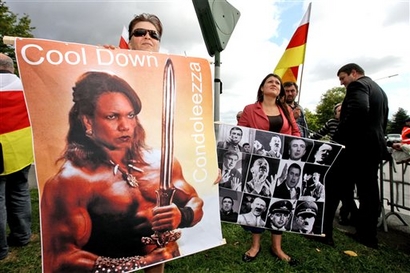 Ossetian protesters demonstrate outside NATO headquarters in Brussels, Tuesday Aug. 19, 2008. U.S. Secretary of State Condoleezza Rice and her NATO counterparts are reviewing relations with Moscow and are expected to curtail high level meetings and military cooperation with Russia if it does not abandon crucial positions across Georgia.
Ossetian protesters demonstrate outside NATO headquarters in Brussels, Tuesday Aug. 19, 2008. U.S. Secretary of State Condoleezza Rice and her NATO counterparts are reviewing relations with Moscow and are expected to curtail high level meetings and military cooperation with Russia if it does not abandon crucial positions across Georgia.(AP Photo/Geert Vanden Wijngaert)
En tout cas, plus rien ne sera comme avant, et l'aventurisme hégémonique de Washington a ramené l'Europe - dont fait partie la Russie, au contraire de la Géorgie, la Turquie et Israël - au bord du gouffre et du chaos. De drôles d'alliés..
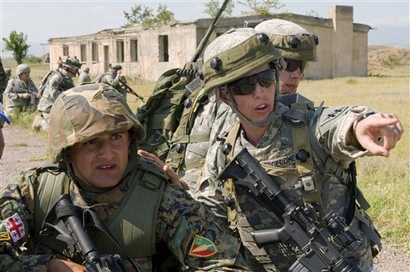 In this July 18, 2008 file photo, Georgian and U.S. servicemen are seen during U.S.-Georgian military training exercise at Vaziani base outside Tbilisi, Georgia. The U.S. five-year-old military training program known as the Georgia Sustainment and Stability Operations Program, has been interrupted, and critically damaged, by a short but intense war with Russia that shocked the West. The war broke out after Georgia tried to retake control of South Ossetia, a Russian-backed separatist region that split off in the early 1990s. Russia had peacekeeping forces in South Ossetia and sent in thousands of reinforcements in short order, driving out Georgian forces.
In this July 18, 2008 file photo, Georgian and U.S. servicemen are seen during U.S.-Georgian military training exercise at Vaziani base outside Tbilisi, Georgia. The U.S. five-year-old military training program known as the Georgia Sustainment and Stability Operations Program, has been interrupted, and critically damaged, by a short but intense war with Russia that shocked the West. The war broke out after Georgia tried to retake control of South Ossetia, a Russian-backed separatist region that split off in the early 1990s. Russia had peacekeeping forces in South Ossetia and sent in thousands of reinforcements in short order, driving out Georgian forces.(AP Photo/Cliff Patrick, File)
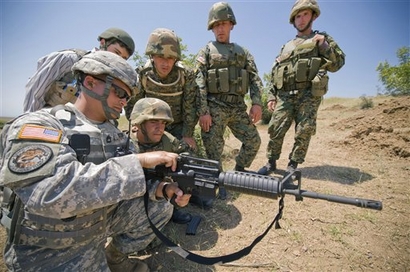 (les médias occidentaux, comme AP & co, oublient de préciser que d'entrée de guerre, les Géorgiens ont abattu des Casques Bleus russes présent en Ossétie.. et Moscou aurait dû rester les bras croisés?)
(les médias occidentaux, comme AP & co, oublient de préciser que d'entrée de guerre, les Géorgiens ont abattu des Casques Bleus russes présent en Ossétie.. et Moscou aurait dû rester les bras croisés?)Six days that broke one country - and reshaped the world order
http://www.guardian.co.uk/world/2008/aug/16/georgia.russia1
Ian Traynor
The Guardian,
Saturday August 16 2008
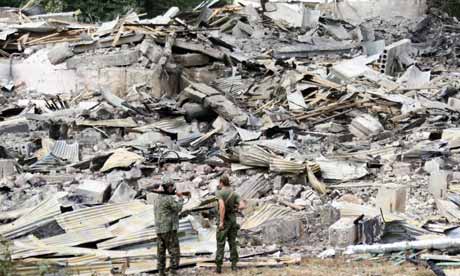
Pity Georgia's bedraggled first infantry brigade. And its second. And its hapless navy.
For the past few evenings in the foothills of the Southern Caucasus on the outskirts of Joseph Stalin's hometown of Gori, reconnaissance units of Russia's 58th army have been raking through the spoils of war at what was the Georgian army's pride and joy, a shiny new military base inaugurated only last January for the first infantry, the army engineers, and an artillery brigade.
A couple of hours to the west, in the town of Senaki, it's the same picture. A flagship military base, home to the second infantry brigade, is in Russian hands. And down on the Black Sea coast, the radars and installations for Georgia's sole naval base at Poti have been scrupulously pinpointed by the Russians and destroyed.
Gori and Senaki are not ramshackle relics of the old Red Army of the type that litter the landscape of eastern Europe. "These bases have only recently been upgraded to Nato standard," said Matthew Clements, Eurasia analyst at Jane's Information Group. "They have been operationally targeted to seriously degrade the Georgian military."
"There is a presence of our armed forces near Gori and Senaki. We make no secret of it," said the general staff in Moscow. "They are there to defuse an enormous arsenal of weapons and military hardware which have been discovered in the vicinity of Gori and Senaki without any guard whatsoever."
The "enormous arsenals" are American-made or American-supplied. American money, know-how, planning, and equipment built these bases as part of Washington's drive to bring Nato membership to a small country that is Russia's underbelly.
The American "train and equip" mission for the Georgian military is six years old. It has been destroyed in as many days. And with it, Georgia's Nato ambitions. "There are a few countries that will say 'told you so'" about the need to get Georgia into Nato," said Andrew Wilson, Russia expert at the European Council on Foreign Relations. "But many more will want to walk away from the problem. And for the next few years, Georgia will be far too busy trying to pick itself up."
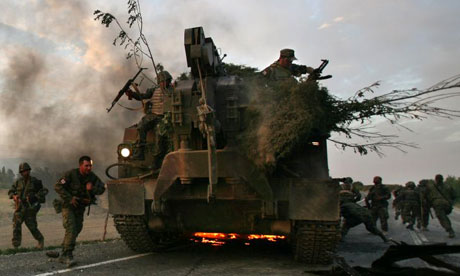 Georgian soldiers escape their burning armoured vehicle on the road to Tbilisi. Photograph: Uriel Sinai/Getty
Georgian soldiers escape their burning armoured vehicle on the road to Tbilisi. Photograph: Uriel Sinai/GettyIf Georgia and Nato are the principal casualties of this week's ruthless display of brute power by Vladimir Putin, the consequences are bigger still, the fallout immense, if uncertain. The regional and the global balance of power looks to have tilted, against the west and in favour of the rising or resurgent players of the east.
In a seminal speech in Munich last year, Putin confidently warned the west that he would not tolerate the age of American hyperpower. Seven years in office at the time and at the height of his powers, he delivered his most anti-western tirade
Pernicious
To an audience that included John McCain, the White House contender, and Robert Gates, the US defence secretary and ex-Kremlinologist, he served notice: "What is a unipolar world? It refers to one type of situation, one centre of authority, one centre of force, one centre of decision-making. It is world in which there is one master, one sovereign. This is pernicious ... unacceptable ... impossible."
This week, he turned those words into action, demonstrating the limits of US power with his rout of Georgia. His forces roamed at will along the roads of the Southern Caucasus, beyond Russia's borders for the first time since the disastrous Soviet occupation of Afghanistan in the 1980s.
As the Russian officers sat on the American stockpiles of machine guns, ammunition, and equipment in Gori, they were savouring a highly unusual scenario. Not since the Afghan war had the Russians seized vast caches of US weaponry. "People are sick to the stomach in Washington," said a former Pentagon official. And the Russians are giddy with success.
Celebrating the biggest victory in eight years of what might be termed Putinism, the dogged pursuit by whatever means to avenge a long period of Russian humiliation and to deploy his limited range of levers - oil, gas, or brute force - to make the world listen to Moscow, the Russian prime minister has redrawn the geopolitical map.
In less than a week, Putin has invaded another country, effectively partitioned Georgia in a lightning campaign, weakened his arch-enemy, President Mikheil Saakashvili, divided the west, and presented a fait accompli. The impact - locally, regionally, and globally - is huge.
"The war in Georgia has put the European order in question," said Alexander Rahr, one of Germany's leading Russia experts and a Putin biographer. "The times are past when you can punish Russia."
That seems to be the view among leading European policymakers who have been scrambling all week to arrange and shore up a fragile ceasefire, risking charges of appeasing the Kremlin.
"Don't ask us who's good and who's bad here," said Bernard Kouchner, the French foreign minister, after shuttling between Tbilisi and Moscow to try to halt the violence. "We shouldn't make any moral judgments on this war. Stopping the war, that's what we're interested in."
His boss, President Nicolas Sarkozy, went to the Kremlin to negotiate a ceasefire and parade as a peacemaker. Critics said he acted as Moscow's messenger, noting Putin's terms then taking them to Tbilisi to persuade Saakashvili to capitulate. Germany also refused to take sides while Italy warned against building an "anti-Moscow coalition".
That contrasted with Gordon Brown's and David Milliband's talk of Russian "aggression" and Condoleezza Rice's arrival in Tbilisi yesterday to rally "the free world behind a free Georgia".
The effects of Putin's coup are first felt locally and around Russia's rim. "My view is that the Russians, and I would say principally prime minister Putin, is interested in reasserting Russia's, not only Russia's great power or superpower status, but in reasserting Russia's traditional spheres of influence," said Gates. "My guess is that everyone is going to be looking at Russia through a different set of lenses as we look ahead."
In Kiev certainly. Ukraine's pro-western president, Viktor Yushchenko, Saaksahvili's fellow colour-revolutionary, is chastened and wary. His firebrand anti-Russian prime minister, Yuliya Tymoshenko [*], has gone uncharacteristically quiet.
[*] erreur : mme Tymoshenko n'est pas anti-russe, et l'a encore montré lors des fêtes religieuses de début juillet. Par contre, son président, installé avec l'argent de Washington, est lui un très fidèle féal du Pentagone!
Invasion
"An invasion of Ukraine by 'peacekeeping tanks' is just a question of time," wrote Aleksandr Sushko, director of Kiev's Institute of Euro-Atlantic Cooperation. "Weimar Russia is completing its transformation into something else. If Russia wins this war, a new order will take shape in Europe which will have no place for Ukraine as a sovereign state."
All around Russia's rim, the former Soviet "captive states" are trembling. Even Belarus, the slavishly loyal "last dictatorship in Europe", went strangely silent, taking days before the regime offered Moscow its support. "Everybody's nervous," said Wilson.
The EU states of the Baltic and Poland are drumming up support for Georgia, with the Polish president Lech Kaczynski declaring that Russia has revealed "its true face". That divides the EU since the French and the Germans refuse to take sides and are scornful of east European "hysteria" towards Russia. Rahr in Berlin says the German and French governments are striving to keep the Poles and the Baltic states well away from any EU-led peace negotiations. It was the Germans and the French who, in April, blunted George Bush's drive to get Georgia into Nato. They will also resist potential US moves to kick Russia out of the G8 or other international bodies.
There are many who argue that Putin's gamble will backfire, that he has bitten off more than he can chew, that Russia remains weak, a "Saudi Arabia with trees" in the words of Robert Hunter, the former US ambassador to Nato.
Compared to the other rising powers of China, India or even Brazil - the companions referred to as the BRIC - Russia does indeed appear weak. Its economy struggles to develop goods or services, depends on raw material exports and on European consumption and the price of oil for its current wealth.
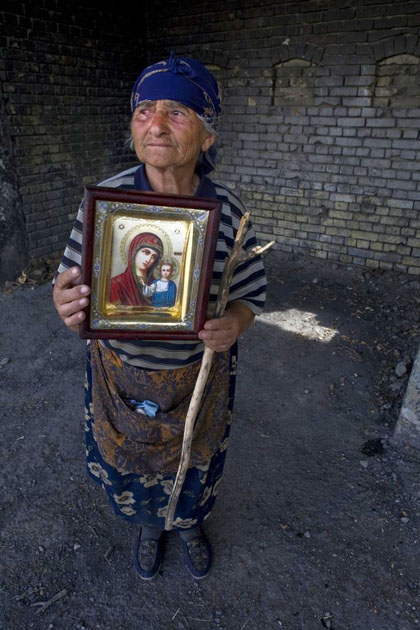 A 73-year-old refugee carries a religious icon
A 73-year-old refugee carries a religious iconPhotograph: Sean Smith
Resources
But Putin's talent is for playing a weak hand well, maximising and concentrating his limited resources, and creating facts on the ground while the west dithers.
"There is a lack of a clear and unified European policy towards Russia," said Clements. In the crucial contest over energy "the Russian strategy of keeping control of exports and supply is outpacing any European response".
Putin may now calculate he can call off the dogs of war, having achieved his aims and able to pocket his gains very cheaply. The Georgia campaign becomes the triumphant climax of Putinism.
"In politics, it is very important to know one's measure," wrote Aleksey Arbatov, director of Moscow's International Security Centre. "If Russia continues to inflict strikes on Georgian territory, on facilities, on population centres, we may lose the moral supremacy we have today."
But Wilson and many in eastern Europe worry that rather than being the climax of Putinism, the Russians in Georgia signal the start of something else. "This may not be a culmination, but only step one," said Wilson. "If you don't stop this kind of behaviour, it escalates."
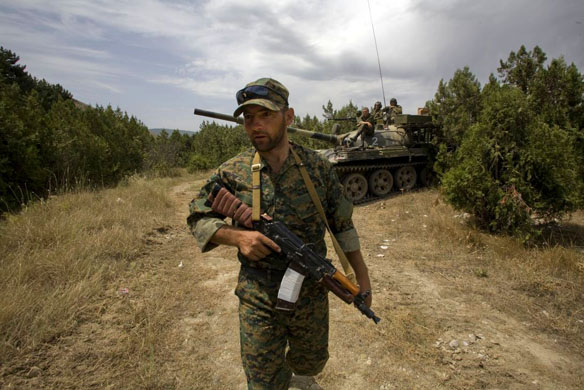 Russian troops on the outskirts of Gori. Tensions continued as Russian and Georgian forces negotiated an end to hostilities
Russian troops on the outskirts of Gori. Tensions continued as Russian and Georgian forces negotiated an end to hostilitiesPhotograph: Sean Smith
-----------------
sommes-nous aveugles au point de persister à gober les mensonges de Washington et des vendeurs de canons US, qui aspirent tant à déclencher une guerre contre les Russes (pour leur propre compte) que contre l'Iran (pour le compte d'Israël)?
Certes, les Russes ne sont pas des enfants de choeur, mais l'agresseur véritable est ici, sans le moindre doute possible, Washington, par le biais de son allié local, la Géorgie. On n'a pas à soutenir un agresseur.
En prime, au contraire des USA, la Russie n'a plus de dette publique - ils se sont affranchis de l'énorme boulet financier profitant aux banques et au FMI. Les guerres affaiblissent aussi les USA, du moins la population américaine, car elles ne font qu'enrichir les Dick Cheney & autres Al Gore. Soutenir ces guerres, c'est aussi prolonger la mainmise des dictateurs libéraux sur la population américaine, qui est venue nous aider en 1918 et 1945, alors que les lobbies US commerçaient avec les Allemands..
Et les échecs patents de l'armée américaine, aussi sur-armée soit-elle, tant en Irak qu'en Afghanistan, montrent qu'en dehors de l'arme nucléaire, elle n'est plus du tout aussi puissante qu'avant, car elle n'a plus la capacité de mener une guerre conventionnelle victorieuse.
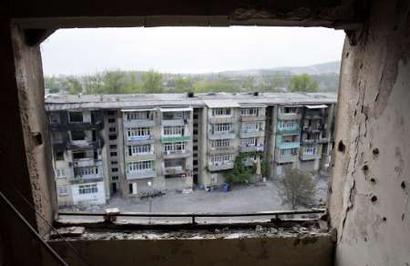 An apartment building which was partly destroyed by a Georgian strike is seen in the South Ossetian capital of Tskhinvali, August 17, 2008.
An apartment building which was partly destroyed by a Georgian strike is seen in the South Ossetian capital of Tskhinvali, August 17, 2008.REUTERS/Denis Sinyakov (GEORGIA)
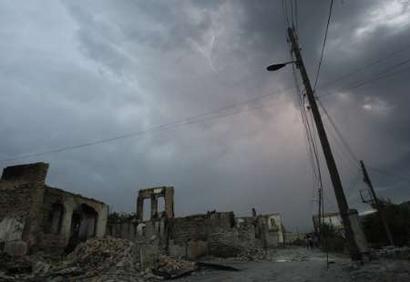 Lightning is seen over a street destroyed by a Georgian strike in the South Ossetian capital of Tskhinvali August 17, 2008.
Lightning is seen over a street destroyed by a Georgian strike in the South Ossetian capital of Tskhinvali August 17, 2008.REUTERS/Denis Sinyakov (GEORGIA)

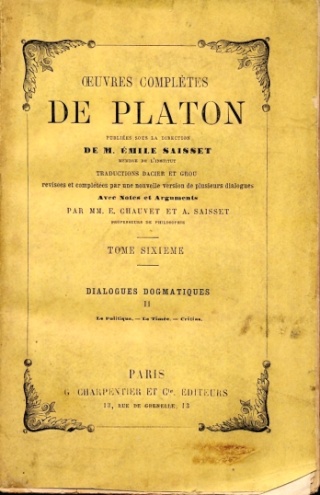



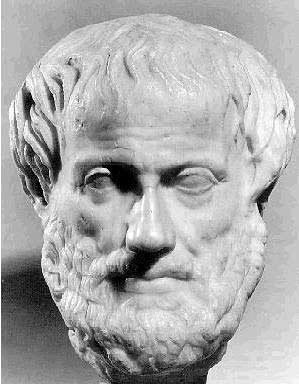
Aucun commentaire:
Enregistrer un commentaire